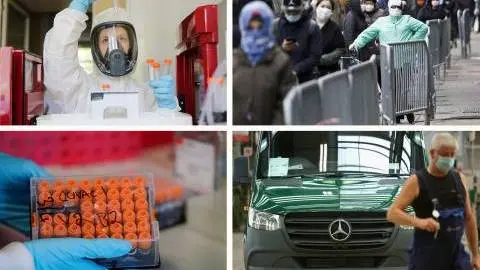China’s longer-than-expected lockdown needs government intervention
Lockdowns in China, especially in Shanghai, have gone on much longer than expected. This is hurting the economy and disrupting supply chains. The government has pledged to come to the rescue
Lockdowns are hurting the economy, mainly by disrupting logistics
The lockdown in Shanghai has lasted more than a month, and we believe that it will continue for another month (throughout May). Beijing is now starting mass Covid-19 testing and is therefore in partial lockdown.
The main source of economic damage from these lockdowns comes from the disruption to logistics. Delivery people are unable to deliver important documents for business operations as they are too busy delivering daily necessities and medicines. Delivery across the city is very difficult. Factories and ports are in closed-loop operations, so entering and leaving these sites is very difficult.
This all damages economic activity: clearly retail is being hit hard, financial services are also taking a hit, as are manufacturing and ports.
Beijing could experience similar issues if large numbers of Covid cases are found after the testing is concluded. Though so far, only 12 cases have been found following the first batch of mass tests.
Government comes to the rescue, but how successful will it be?
The government, including the People's Bank of China, has said it will execute policy actions to support economic growth.
The main thing we have seen so far is that the PBoC has cut the Reserve Requirement Ratio on foreign currency deposits to release dollars for financial institutions to buy yuan in financial markets. This has prevented a further depreciation of the USD/CNY and USD/CNH beyond 6.60.
The PBoC has also said that it will speed up regulation on the platform economy (i.e. companies including Alibaba and Tencent) that have provided fintech services to society. This also helped lift the Chinese equity market, but only for a short while.
The third thing – again so far just a pledge rather than action – the government (from President Xi Jinping to Vice Premier Liu He), has pledged to push forward the construction of infrastructure projects. If this is put into action, it means an increase in bond issuance by local governments to fund those projects as well as to kick off construction. This is likely to be done. Airport infrastructure is already under construction, and some highways are, too. Green energy projects should also have been planned from 4Q21 when local government special bond quotas for 2022 were released.
The question here is whether these policies can keep GDP growth at the 4.8% year-on-year level seen in the first quarter.
Policy pledge and actions
Forecast revision, again
When Shanghai started its lockdown, we revised our GDP forecast for full-year 2022 down from 4.8% to 4.6% year-on-year. Considering the net effect of negative factors from lockdowns and positive factors from potential government action, we are downgrading our China GDP growth forecast further to 3.6% for this year, with the 2Q22 GDP growth rate revised to -1% year-on-year.
Our calculation is based on GDP per capita in the city and assumes some multiplying damage from the lockdowns, for example, import and export activity at ports that are used for other locations in China.
The risk to this forecast is that the government is unable to push infrastructure projects forward as quickly as it would like and as quickly as would be needed to totally offset the negative factors. And so, even though President Xi and Vice Premier Liu He are taking steps to make this happen, there are still limits as to what can be done during the two months left in 2Q22.
Download
Download article
4 May 2022
ING Monthly: Hiking in the dark This bundle contains 12 articles"THINK Outside" is a collection of specially commissioned content from third-party sources, such as economic think-tanks and academic institutions, that ING deems reliable and from non-research departments within ING. ING Bank N.V. ("ING") uses these sources to expand the range of opinions you can find on the THINK website. Some of these sources are not the property of or managed by ING, and therefore ING cannot always guarantee the correctness, completeness, actuality and quality of such sources, nor the availability at any given time of the data and information provided, and ING cannot accept any liability in this respect, insofar as this is permissible pursuant to the applicable laws and regulations.
This publication does not necessarily reflect the ING house view. This publication has been prepared solely for information purposes without regard to any particular user's investment objectives, financial situation, or means. The information in the publication is not an investment recommendation and it is not investment, legal or tax advice or an offer or solicitation to purchase or sell any financial instrument. Reasonable care has been taken to ensure that this publication is not untrue or misleading when published, but ING does not represent that it is accurate or complete. ING does not accept any liability for any direct, indirect or consequential loss arising from any use of this publication. Unless otherwise stated, any views, forecasts, or estimates are solely those of the author(s), as of the date of the publication and are subject to change without notice.
The distribution of this publication may be restricted by law or regulation in different jurisdictions and persons into whose possession this publication comes should inform themselves about, and observe, such restrictions.
Copyright and database rights protection exists in this report and it may not be reproduced, distributed or published by any person for any purpose without the prior express consent of ING. All rights are reserved.
ING Bank N.V. is authorised by the Dutch Central Bank and supervised by the European Central Bank (ECB), the Dutch Central Bank (DNB) and the Dutch Authority for the Financial Markets (AFM). ING Bank N.V. is incorporated in the Netherlands (Trade Register no. 33031431 Amsterdam).
